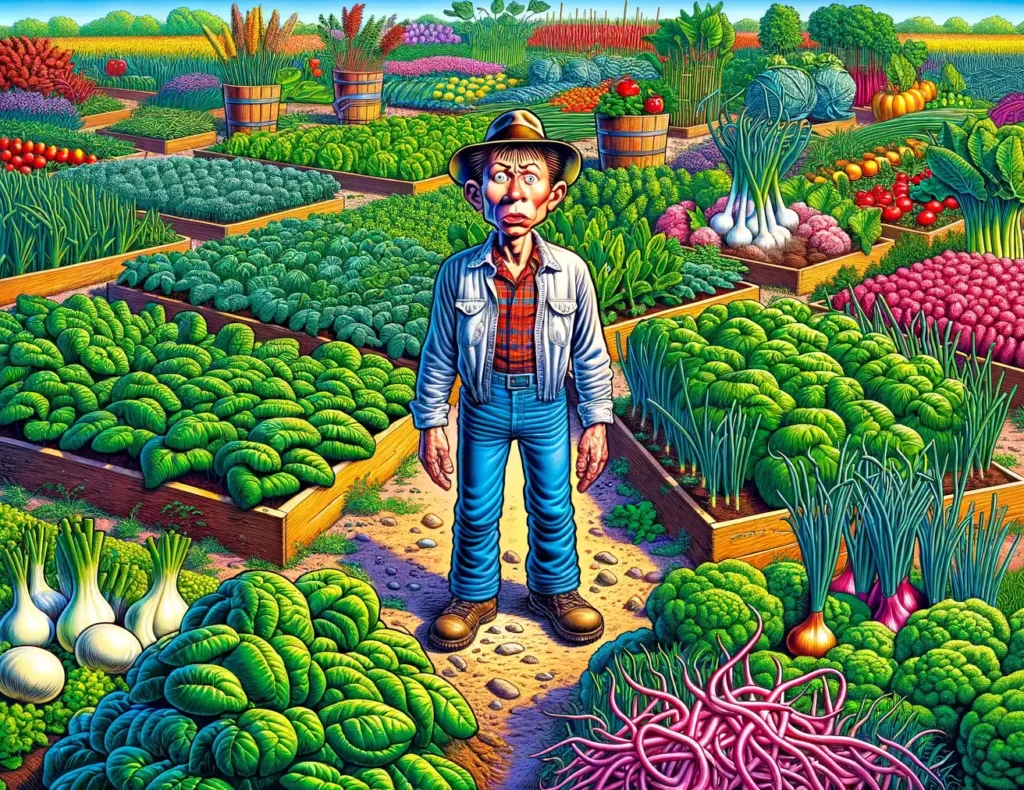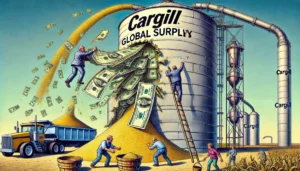
April Harvest A vibrant and detailed illustrative scene in the style of Mad Magazine depicting a farmer standing in the middle of his diverse garden looking confu2.webp.webp
Welcome to the Whimsical World of Spring Gardening
Practical Guidance on the April Harvest!
Who says there isn’t anything to do on a farm in April!
As the frost of winter melts away, the stage is set for the vibrant and somewhat theatrical emergence of spring’s first crops. The garden, a verdant theatre of greenery, becomes a lively scene of growth and intrigue. In this whimsical world, vegetables are not merely food; they are characters in a playful drama that unfolds under the April sun. From the aristocratic asparagus, which pierces the soil with the grace of a knight, to the tart rhubarb, masquerading as a dessert delight, each plant brings its own personality and story to the garden. Join us as we delve into the secret lives of these April crops, where every sprout and leaf tells a tale of nature’s playful spring awakening.
Asparagus is one of the first crops to pop up in April, making it nature’s way of saying, “Surprise! You still remember how to garden, right?” — Barny Fieldstone

Asparagus: The Aristocrat of the Vegetable Patch
As April rolls in, asparagus spears thrust through the soil like tiny green knights in a vegetable joust. The aristocrats of the garden, they stand tall and proud, demanding attention (and a bit of hollandaise sauce). Local gardener, Phil Greenfingers, claims, “Asparagus is the only reason I throw a dinner party in April. It’s either that or wear a monocle and top hat at breakfast.”

Rhubarb: The Sour Intruder
Meanwhile, rhubarb sidles into the season with the tartness of an uninvited aunt. Known for its deceptive appearance—think celery’s crimson cousin gone rogue—it conspires its way into pies and fools us all into calling it a fruit. “Every year, rhubarb tricks us into dessert,” states pie enthusiast Betty Crumble. “It’s like inviting someone sour to your party and finding out they brought the best wine.”
Spring Onions: The Weepy Welcomer
Not to be outdone, spring onions make their tear-jerking appearance, slicing through the calm of spring gardens with all the subtlety of a reality TV star at a library. Chef Al Dente notes, “Chopping spring onions is the only time I can cry in the kitchen without my sous chefs worrying about my mental stability.”

Leafy Greens: The Hipsters of Horticulture
Spinach and lettuce, the cool kids of the crop world, spread out with the enthusiasm of urbanites at a vintage vinyl sale. They thrive in the chill, making them the ultimate hipsters of horticulture. “If spinach and lettuce could wear glasses and beanies, they would,” remarks fashion-forward farmer, Daisy Chain. “They’re cool long before summer makes it hot.”

As the Garden Grows
As these crops make their grand entrance, the garden becomes a stage for an April drama filled with ambition, deception, and a bit of overacting. It’s a place where asparagus insists on being the center of attention, rhubarab usurps the dessert menu, onions bring on the tears, and leafy greens chill out in their cool-weather gear. The only thing missing is popcorn, though give it a season—that might just be the next big thing in crop innovation.

Who says there isn’t anything to do on a farm in April!
15 Laborious Observations on April Harvesting
- Asparagus Alert: Asparagus is one of the first crops to pop up in April, making it nature’s way of saying, “Surprise! You still remember how to garden, right?”
- Rhubarb’s Tart Revenge: Rhubarb is harvested in April and is as tart as your grandmother’s comments at family dinners. Just when you thought it was safe to make a pie.
- Spring Onions: These little guys are just waiting to spring up and bring tears to your eyes—not from emotion, but because you forgot goggles while chopping them.
- Lettuce Pray: Leafy greens like spinach and lettuce thrive in cool spring weather, basically the plant world’s version of people who wear shorts and flip flops in 60-degree weather.
- Asparagus’ Spear Factor: Ever notice how asparagus spears look like they’re ready for a tiny vegetable joust? April is officially the start of the veggie medieval times.
- Rhubarb’s Plot: Rhubarb starts off looking like a red celery and ends up in pies. It’s the ultimate plant plot twist.
- The Onion Layer Paradox: Spring onions come up in April and are the only crop that can make you cry and claim it’s just allergies.

Spinach and Lettuce – A vibrant and detailed illustrative scene in the style of Mad Magazine, featuring a variety of leafy greens like spinach and lettuce thriving in a … - Spinach’s Sneaky Strategy: Spinach grows so fast in cool weather it’s practically sprinting. Blink and it’s gone from baby spinach to full-grown blanket.
- Lettuce: The Cool Kid: Lettuce thrives in cool weather, making it the hipster of spring vegetables—cool before it’s hot.
- Asparagus Stalk-er: Getting asparagus from garden to table is a race against time before the stalks decide to grow into their own mini forest.
- Rhubarb Rhap-sody: Rhubarb, the only crop that starts off as a vegetable and masquerades as a fruit in desserts. Seriously, what identity crisis?
- The Overachieving Onions: Spring onions are so eager; they’re the overachievers of the garden, ready way before anyone else even thought about getting up.
- Spinach’s Iron-y: Isn’t it ironic? Spinach is packed with iron yet is as delicate as the most sensitive ego.
- Mystery of the Multiplying Lettuce: Plant one head of lettuce, and suddenly your garden is a lettuce party. It’s like they multiply using garden magic.
- Asparagus Etiquette: Asparagus makes every dinner feel like a fancy gathering, even if you’re just in your pajamas. It’s like the monocle of the vegetable world.

Originally posted 2016-09-27 12:45:58.
Originally Published at FarmerCowboy.com
2024-12-05 02:50:25
Karl Hoffman is a distinguished agriculturalist with over four decades of experience in sustainable farming practices. He holds a Ph.D. in Agronomy from Cornell University and has made significant contributions as a professor at Iowa State University. Hoffman’s groundbreaking research on integrated pest management and soil health has revolutionized modern agriculture. As a respected farm journalist, his column “Field Notes with Karl Hoffman” and his blog “The Modern Farmer” provide insightful, practical advice to a global audience. Hoffman’s work with the USDA and the United Nations FAO has enhanced food security worldwide. His awards include the USDA’s Distinguished Service Award and the World Food Prize, reflecting his profound impact on agriculture and sustainability.




What do you call a pig with no nose? Pointless!
You won’t find better satire anywhere else. Bohiney News is where the laughs live. Head to bohiney.com!